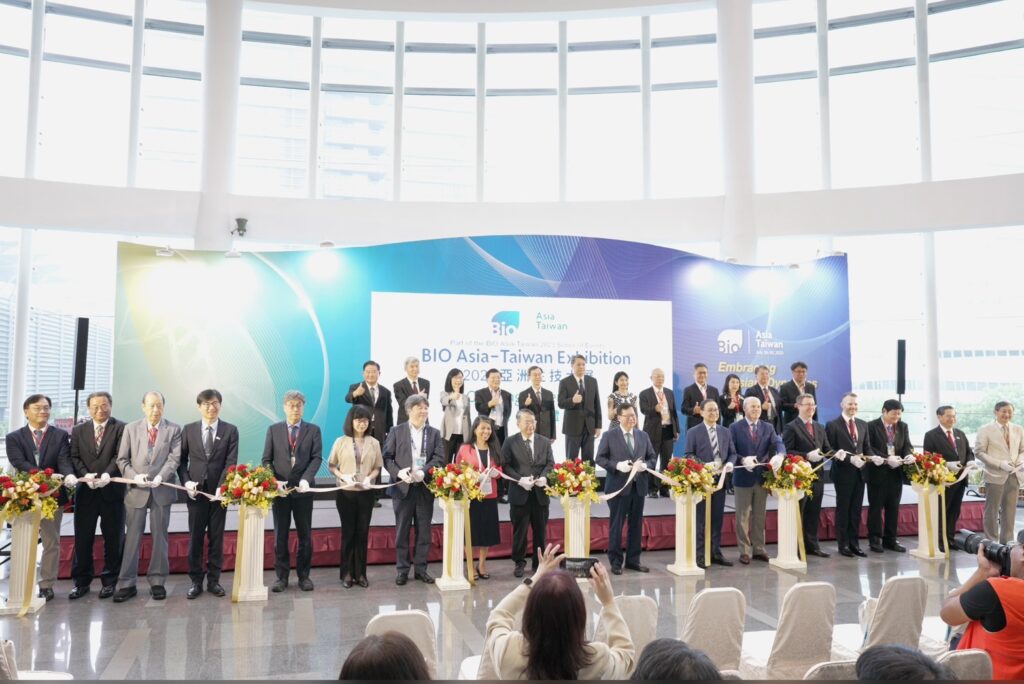International partnerships are vital to delivering new biotech solutions for the health of people and the planet—and strong policies, both in the U.S. and worldwide, are needed to support the growth of the global biotech sector, agreed industry leaders at BIO Asia-Taiwan in July.
Organized by Taiwan Bio in collaboration with the Biotechnology Innovation Organization (BIO), BIO Asia-Taiwan 2023 brought together more than 1,500 biotech leaders from around the world—more than before the pandemic. In addition to dignitaries including Taiwan’s Executive Yuan and Vice Premier Cheng Wen-tsan, guests included BIO President and CEO Rachel King as well as Chief Policy Officer John Murphy III and Susanna Ling, VP of Industry Partnerships and Sponsorship, who spoke about the link between policy and partnership when it comes to advancing new biotech innovations.
Johnsee Lee, Chairman of BIO Asia-Taiwan, and Chung-Hsiun Wu, Chairman of the Taiwan Bio Industry Organization (Taiwan BIO), highlighted the event’s theme of “Embracing Asian Dynamics” as a way to foster cooperation and expand international participation with all sectors of Asia’s growing biomedical sector.
As biotech companies are developing innovative cures, crops, and manufacturing techniques, partnerships—including international ones—are key to bringing these solutions to market faster. Government policies can drive or dampen that progress—and even U.S.-focused policies, like the Inflation Reduction Act (IRA) and President Biden’s Executive Order on biomanufacturing, have implications beyond U.S. borders, Murphy and Ling detailed in remarks.
“Partnering is a cornerstone of this sector,” Ling told Bio.News. “We need cross-border collaborations to advance R&D, commercialization, and access,” as well as to “foster investments and international trade.”
BIO Asia-Taiwan is particularly important as Asia grows both as a hub for innovation as well as a critically important market. The growth in domestic and foreign licensing transactions, explained Ling, highlights the importance of cross-border cooperation.
Why is international biotech collaboration important?
During the BIO International Convention in Boston in June 2023, BIO and Taiwan Bio held a ceremony to extend their partnership for three more years, which “will enable us to explore new ways to work together and advance biotechnology around the world,” said BIO President and CEO Rachel King in her opening remarks at BIO Asia-Taiwan.
“More than 42% of registrants at BIO’s convention were from outside of the United States. Data shows that biotechnology will continue to grow around the world, including in East Asia, and Taiwan Bio will lead this bio-revolution, helping our industry advance new cures and innovations,” said King.
Every country in the world shares similar challenges: the growing risk of infectious disease pandemics and the growing scourge of chronic disease, aging populations that require new treatments, climate change and its impact on food and energy.
“To succeed, we have to share knowledge and build partnerships, both within and outside of our home regions,” continued King. “Our industry is at the forefront of developing solutions to these global challenges. But we must work together to ensure people everywhere benefit from our breakthroughs.”
And conferences, like the BIO International Convention and BIO Asia Taiwan, are key: “Collaboration breeds new ideas and spurs new products, creates emerging industries, and ultimately, saves lives,” she concluded.
BIO Asia-Taiwan, by the numbers
The 2023 BIO Asia-Taiwan drew more than 1,500 attendees, and 34.4% were international from far-flung countries including the United States, Canada, Italy, Austria, Australia, Malaysia, and India.
More than 2,000 exhibitors at the event drew more than 100,000 exhibition attendees.
In addition, BIO hosted the BIO One-on-One Partnering platform, where over 5,300 meetings were requested and 755 were scheduled—highlighting the desire for more international collaboration across the sector.




